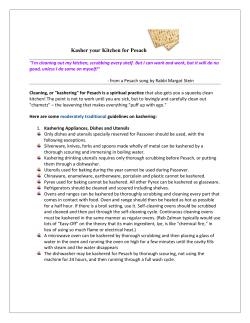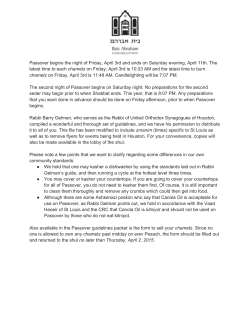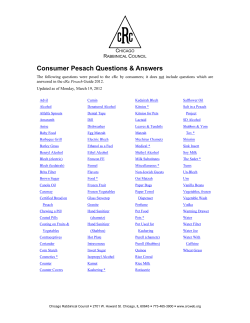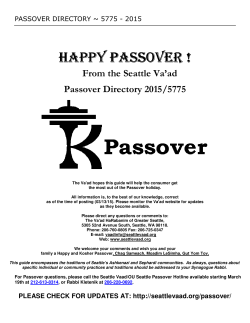
Passover Update 2015 - Adat Shalom Synagogue
Passover Update 2015 “E AT T HIS ! N OT T HAT !” WITH R ABBI B ERGMAN Haggadah-La-La “FINDING YOUR OWN with Hazzan Gross A GUIDE TO HAPPY PASSOVER FOODS! Tune up your seder songs! M ONDAY, M ARCH 23 7 P. M . EDER S T S FIR , April 3 y Frida S UNDAY, M ARCH 29 11 A . M . First Days WAY TO FREEDOM” WITH R ABBI S HERE W E MAY BE OUT OF E GYPT , BUT IS E GYPT OUT OF US ? WEDNESDAY, APRIL 1 11:45 A.M. – Passover Services - Friday, April 3 . . . . . . . . . . . . . . . . . . . . . 6 p.m. Saturday, April 4 . . . . . . . . . 9 a.m. & 7:45 p.m. Sunday, April 5 . . . . . . . . . . . 9 a.m. & 8:15 p.m. Concluding Days Thursday, April 9 . . . . . . . . . . . . . . . . . . . 6 p.m. Friday, April 10. . . . . . . . . . . . . . 9 a.m. & 6 p.m. Saturday, April 11 . . . . . . . . . . . 9 a.m. & 8 p.m. (Yizkor Prayers will be recited during the Saturday service.) Siyum HaB’khor - Friday, April 3 The Concluding Study Session “Spiritual Growth Versus Spiritual Materialism” with Rabbi Bergman 7:30 a.m. - Shacharit Service and Siyum PASSOVER CANDLE LIGHTINGS April 3 April 4 April 9 April 10 7:43 p.m. 8:45 p.m. 7:49 p.m. 7:50 p.m. 4 Jews commemorate the sparing of the Hebrew first-born sons in the Pesach story by concluding the study of a section of Jewish text the morning of the first Seder (or the previous day if the Seder will fall on Shabbat). This year Rabbi Bergman will conclude Masechet Pesachim with a session on “Spiritual Growth versus Spiritual Materialism.” Judaism has always valued spiritual and intellectual growth, but not at the expense of moral responsibility to others. We will study a passage that will challenge us in how to live our religious lives in harmony with every other aspect of our lives. From the Middle Ages on, prominent Rabbis have stated that first- born daughters should attend the siyum as well. At Adat Shalom all members of your family, whatever their birth order, are invited to join in the siyum and the deluxe chametz breakfast to follow. CHAMETZ BREAKFAST BUFFET followed by a “bonfire” for the burning of your chametz Each year our breakfast has become more and more popular. If you would like to be a cosponsor of this special breakfast in honor of your first-born, please contact Denise Gallagher, (248) 851-5100, ext. 221 or dgallagher@adatshalom.org. PASSOVER 2015 COSMETICS AND TOILETRIES All varieties of body soaps, shampoos and stick deodorants are permitted for use on Pesach, regardless of ingredients. All types of ointments, creams, nail polish, hand lotions, eyeshadow, eyeliner, mascara, blush, foot and face powders, ink and paint may be used, regardless of their ingredients. Colognes, perfumes, hair spray, shaving lotions, and deodorants that have restorable, denatured alcohol should not be used. This applies only to products in a pure liquid state. Lipstick that contains chametz should not be used. KITCHEN SINK A metal sink can be kashered by thoroughly cleaning it, then leaving it unused for 24 hours, and then pouring boiling water into it. A porcelain sink should be cleaned and a sink rack used. If, however, dishes are to be soaked in a porcelain sink, a dish basin must be used. KASHERING OF UTENSILS The process of kashering utensils depends on how the utensils are used. According to halakah, leaven can be purged from a utensil by the same process in which it was absorbed in the utensil (ke-voleo kakh poleto). Therefore, utensils used in cooking are kashered by boiling, those used in broiling are kashered by fire and heat, and those used only for cold food are kashered by rinsing. EARTHENWARE may not be kashered. However, fine translucent chinaware and earthenware which has not been used for more than a year may be used if scoured and cleaned in hot water. SISTERHOOD GIFT SHOP SEDER PLATES - MATZAH COVERS MIRIAM’S CUPS - SPECIAL COLLECTIBLES PLAGUE KITS - PUPPETS AND MORE... SUNDAYS 9 A.M. - NOON DURING RELIGIOUS SCHOOL FOR SPECIAL APPOINTMENTS, CALL CAROL VIEDER, 248-821-4512 STACY BRICKMAN, 248-310-4600, LILLIAN SCHOSTAK, 248-310-2018 METAL UTENSILS USED IN FIRE Metal (wholly made of metal) utensils used in fire (spit, broiler) must first be thoroughly scrubbed and cleansed and then made hot until it glows. Those used for cooking or eating (silverware, pots) must be thoroughly scrubbed and cleaned and not used for 24 hours. Then they are completely immersed in boiling water. Metal baking utensils cannot be kashered. GLASSWARE There are two different ways of kashering glassware. Glass cookware includes cookware made of modern materials that are non-porous, such as Pyrex®. If you don’t have a dishwasher, you may soak the items in water for three days, changing the water every 24 hours. The other way requires only that they be put through a clean dishwasher with no other items. TABLES, CLOSETS AND COUNTERS If used with chametz, they should be thoroughly cleaned and covered, and then they may be used. Note that the covering material should be made of material that is not easily torn. CHAMETZ AND NON-PASSOVER UTENSILS Non-Passover dishes, pots and chametz whose ownership has been transferred to a non-Jew should be separated, locked up or covered, and marked in order to prevent accidental use. R POST–PESACH ACTIVITIES estoring your home to “chametz” is a simple matter, consisting mainly of putting away Pesach utensils and bringing back the chametz items to their regular places. Pesach is concluded by havdalah said over wine. (The blessings over the candle and the spices are reserved for the conclusion of Shabbat.) Some families have a custom of eating a heavily chametz meal, such as pizza, or at least eating some foods that they sorely missed during Passover. For others, the transition back to chametz is a slow one, taking place during the omer period, a transition that goes from the Pesach meals of matzah and meat to the Shavuot meals of dairy foods and leavened bread. Chametz may be eaten again after 8:45 p.m. on Saturday, April 11. The Clergy, staff and Adat Shalom leadership wish you and yours a happy, healthy and Kosher Pesach! PASSOVER 2015 B Bedikat Chametz - The Search for Leaven - edikat Chametz (The Search for Leaven) will be held this year on Thursday, April 2. By tradition, bread crumbs are placed conspicuously in rooms where food is ordinarily eaten or brought. Using a candle for illumination, a “search” is made to find the remnants of chametz, which are then collected using a feather as a whisk. The blessings said at this time are found at the beginning of a traditional Haggadah. S ince the Torah prohibits the eating of chametz during Pesach, and since many common foods contain some admixture of chametz, guidance is necessary when shopping and preparing for Pesach. During the eight days of Pesach, chametz cannot lose its identity in an admixture. Therefore the most minute amount of chametz renders the whole admixture chametz, and its use on Pesach is prohibited. However, during the rest of the year, chametz follows the normal rules of admixture, i.e. it loses its identity in an admixture of one part chametz and sixty parts of non-chametz (batel beshishim). This affords us the opportunity to differentiate between foods purchased before and during Pesach. What follows are some general guidelines. However, our rabbis should be consulted when any doubt arises. Kosher le-Pesach items that do not bear the name of a rabbi or one of the recognized symbols of rabbinic supervision, or which are not integral to the package, should not be used without consulting our rabbis. Prohibited foods include the following: leavened bread, cakes, biscuits, crackers, cereal, coffee with cereal derivatives, wheat, barley, oats, spelt, rye, and all liquids containing ingredients or flavors made from grain alcohol. “Selling” Your Chametz T he Torah prohibits a Jew’s ownership of chametz (leaven) during Pesach. Therefore, we arrange for the sale of the chametz to a non-Jew. The transfer, mekhirat chametz, is accomplished by appointing an agent to handle the sale. It is a valid and legal transfer of ownership. At the end of the holiday, the agent arranges to reverse ownership of the now permitted chametz. If the ownership of the chametz is not transferred before the holiday, the use of this chametz is prohibited after the holiday as well (chametz sheavar alav haPesach). Ritual Director Barry Lippitt will arrange for the selling of your chametz beginning Sunday, March 22 after morning and evening minyans (except on Shabbat) through Friday, April 3 (Erev Pesach.) You may see him personally or call him at (248) 851-5100, ext. 230. Permitted Foods that require no kosher le-Pesach label if pur- chased prior to Pesach include: unopened packages or containers of natural coffee without cereal additives (be aware that coffees produced by General Foods are not kosher for Passover unless marked KP); sugar, pure tea (not herbal tea); salt (not iodized); pepper; natural spices; frozen fruit juices (with no additives); frozen (uncooked) vegetables; milk; butter; cottage cheese; cream cheese; ripened cheeses such as cheddar (hard), muenster (semi-soft) and Camembert (soft); frozen (uncooked) fruit (with no additives); baking soda. Permitted Foods that require no kosher le-Pesach label if purchased before or during Pesach include: fresh fruits and vegetables, eggs, fresh fish and fresh meat. Permitted Foods that require a kosher le-Pesach label if pur- chased prior to Pesach include all baked products (matzah, cakes, matzah flour, farfel, matzah meal and any products containing matzah); canned or bottled fruit juices; canned tuna; wine; vinegar; liquor; oils; dried fruits; candy; chocolate-flavored milk; ice cream; yogurt and soda. Detergents - If permitted during the year, powdered and liquid detergents do not require a kosher le-Pesach label. Medicine required for health-sustaining therapy may be used on Pesach. If not for health-sustaining therapy, consult one of our rabbis. In all cases, capsules are preferred to pills, with or without chametz binders. Before discontinuing any medication, consult a rabbi and your physician. Information on these pages has been adapted from guides prepared for the Rabbinical Assembly Committee on Jewish Law and Standards. If you have further questions, please contact our Clergy.
© Copyright 2025















